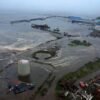ISLAMABAD: Following recent sentences handed down to multiple PTI leaders and members by anti-terrorism courts (ATCs), Opposition Leader in the National Assembly Omar Ayub Khan has written to the Chief Justice of Pakistan (CJP), raising concerns over alleged “constitutional and procedural violations” in the May 9 riots cases.
Last week, various anti-terrorism courts across different cities sentenced senior PTI officials and lawmakers to 10 years in prison for their involvement in the May 9 disturbances. In his letter, Omar urged CJP Justice Yahya Afridi to scrutinize the conduct of all ongoing May 9 trial proceedings, emphasizing the need to uphold fairness and adhere to due process standards. He also requested the court to review and potentially reopen trials that have been completed under what he describes as “manifestly unjust conditions,” and called for a judicial investigation into allegations of police and prosecutorial misconduct in these cases.
Describing the trials as “expedited and unjust,” Omar expressed concern that the integrity of Pakistan’s judicial system is under serious threat. He argued that instead of delivering justice, the proceedings have become tools for political victimization.
He further claimed that PTI leaders, supporters, and workers have been “wrongfully implicated” through procedures that appear malicious and politically motivated. Omar pointed out that police reports and prosecution efforts are lacking credible evidence and are marred by procedural irregularities.He urged the CJP to address issues of “prosecutorial overreach and police misconduct,” including the fabrication of FIRs, coercive interrogation tactics, and the selective registration of cases against opposition figures — all of which undermine the rule of law and erode public trust in the justice system.”The fundamental right to choose legal counsel, protected under Article 10A of the Constitution, has been disregarded. Courts often deny adjournments and, in many instances, threaten or proceed to appoint state-appointed lawyers without the consent of the accused,” he added.
Omar emphasized that these trials are more than just legal proceedings; they serve as a measure of Pakistan’s commitment to democracy, justice, and constitutional principles. “If these trials continue under the current hurried, secretive, and politically charged conditions, the damage to Pakistan’s judicial reputation and public confidence will be irreversible,” he warned.
He called on the CJP to intervene by directing courts to hold proceedings during reasonable hours, avoiding early morning sessions that cause fatigue and unfair disadvantages. Omar also insisted that accused individuals should have the right to legal representation of their choice, and that transparency be maintained through media access and open court proceedings, especially given the high-profile nature of these cases.
Recently, dozens of PTI leaders, workers, and supporters received 10-year sentences after being convicted in connection with the May 9 riots. Among those sentenced were Punjab Assembly Opposition Leader Malik Ahmed Khan, PTI MNA Mohammad Ahmed Chattha, Dr. Yasmin Rashid, Mian M. ur Rasheed, former Punjab governor Omar Sarfraz Cheema, Senator Ejaz Chaudhry, and Afzal Azeem.
These verdicts have added to the legal challenges faced by PTI, which launched an anti-government campaign last week, aiming for a crescendo by August 5 — following directives from the imprisoned PTI founder.
The events of May 9, 2023, refer to violent protests that erupted across multiple cities after the arrest of PTI leader and former Prime Minister Imran Khan. Demonstrators attacked public property and military installations, including the Corps Commander House in Lahore, known as Jinnah House. The protests were sparked by Khan’s arrest from the Islamabad High Court premises in a corruption case. While some PTI members and leaders have been released on bail, many remain in custody. Khan, who was ousted from office via a no-confidence motion in April 2022, continues to be a central figure in Pakistan’s political landscape



